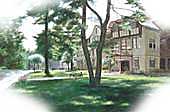Summer
1984
Trouble a Servant
John Wright Follette
Among many people there is an idea or notion that the life
of the Christian should be a sort of charmed life, void of
trouble, testing and tribulation or suffering. Such people
have shaped for themselves an impossible or unscriptural conception
as an objective.
Where in the world such people, so bewitched, have been living
all these years, or what books of history they have read,
is quite beyond me! Surely they do not know history, Christian
experience, or the Bible. For all these keep ever before us
the truth that, “man is born unto trouble, as the sparks
fly upward” (Job 5:7). “Many are the afflictions
of the righteous, but the Lord delivereth him out of them
all” (Psa. 34:19). “For our light affliction,
which is but for a moment, worketh for us a far more exceeding
and eternal weight of glory” (II Cor. 4:17). “Yea,
and all that will live godly in Christ Jesus shall suffer
persecution” (2 Tim. 3:12). “In the world ye shall
have tribulation: but be of good cheer; I have overcome the
world” (John 16:33). “And not only so, but we
glory in tribulations also: knowing that tribulation worketh
patience” (Rom. 5:3).
Surely on the basis of all these scriptures, we as Christians
know better than to pray for exemption from trouble, and since
we know that in God’s plan it is a part of our inheritance,
let us not avoid its peculiar ministry.
History is replete with examples of lives wrecked because
of the ungrateful reaction to trouble. In spite of the accumulated
experiences of the ages and the wisdom and philosophy of the
seers, many still fail to recognize that behind her mask,
trouble is a servant to assist us. Any other view is due to
lack of vision and perspective in that range. Too many see
the immediate, the local, and interpret life and relative
questions from a circumscribed point. The scriptures say,
“While we look not on the things seen . .” as
Christians, after we are convinced in our heart, that trouble
is not designed to defeat us, is not a mere nuisance or cruelty,
but is one of the corrective elements in great living, we
must needs learn how to use it. How many problems would be
solved and shipwrecks of faith be avoided, could we take a
positive, constructive attitude and see that trouble is one
of the agents and mighty instruments placed in our hands for
the shaping of character and the releasing of potential power
for correct and glorious building.
How do you use trouble? Naturally, we shun pain, discomfort
or trouble. But that is because we merely relate them to their
effect upon the physical situation or present mood. So many
hours are spent praying that trouble, the great servant, will
be removed from our lives. At times we take long, circuitous
journeys to avoid meeting with her. Finally, when we are compelled
to meet her, we spend a long, long time telling her, or God,
that we do not like her and we wonder and wonder why we ever
had to meet her at all. But trouble is not to be reasoned
with; she is utterly unreasonable. She is to be used.
Please disabuse your minds of the erroneous thought that
if you are good, or a really spiritual Christian, totally
yielded and consecrated, your life is therefore to be a charmed
one and that God will spare you from trouble or disappointment.
No, to reach such a fine place of consecration and yieldedness,
is only to make you a fit candidate for tribulation. Tribulation
is a word God uses in relation to saints. The etymology of
the word means “threshing.” A farmer does not
thresh weeds: he threshes the golden wheat, that the grain
may be separated from the chaff and sticks. He is seeking
grain, not trying to pound out some straw. Therefore He says,
“Tribulation worketh patience” – that is,
the golden grain of patience, longsuffering and kindness comes
by way of threshing or tribulation. Think of the splendid
spiritual grain of character and noble living produced only
through the tribulation process. The spirit throne and quality
of the mighty men of old came only through trouble and suffering.
If the Christian has anything that remotely resembles the
character of Christ he can make trouble to be a servant to
bring forth the best in him. This I suggest – that “Trouble
is a servant.”
But trouble in itself is neutral, or passive; the whole matter
depends upon how we use it. One may take an inactive attitude
and lose the benefit of the trial; he may justify himself,
and become bitter or resentful; or it can make him hard, cruel
and cynical. People who have no faith, no perspective of thought
or vision, let trouble do all sorts of harmful and cruel things
to them. But thanks be to God, there are many wonderful people
upon whom trouble has fallen who were able to see and discern
behind its mask a servant, at their beckon and call, to build
them lives of strength and beauty.
In a simple study of such lives we find a certain creative
power which makes out of their calamity a magnificent privilege.
You have noticed in lives a two-fold reaction to trouble or
tragedy; either it will break us in spirit, melting the hardness
and bringing us in our helplessness to God; or it will throw
us upon our feeble resources and human reasonings –
and this, in turn, at times hardens us in spirit, makes us
critical and often cynical. It robs the heart of the great
privilege of trusting God and the developing of the life into
rich and helpful avenues. Trouble will make your either bitter
or better. Notice how very much alike these words are, and
how very little is needed to change them; just the letter
“I.” It is the “I” that changes the
whole matter. When the “I” keeps out of the question,
out of the difficulty, life will be better, but when the “I”
is introduced and we get mixed in the trouble, life will become
bitter and we get hard. Too many times this “I”
gets in the way, the poor, little hurt ego gets a slap and
down the street he runs, screaming for attention; the dear
little ego sits in his doorway and weeps tears of self-pity
until his eyes are so red and inflamed he cannot see things
as they are or should be. It takes the quiet heart, peace
of spirit, and clear vision (long range, if you please,) to
interpret trouble in terms of strength.
Some live as though life, and the Christian experience, were
some kind of a slot machine; you put in a dime’s worth
of kindness and pull out three years of blessing; then five
cents worth of charity and you think God must bless you next
Saturday night. Be very good, kind, or generous and next week
the wind will blow you a fortune. It is true that what we
sow we shall also reap; and bread cast upon the waters shall
return, but God is not too clear on the time element. So we
shall not always receive our justice here and now.
Jesus never taught His followers to expect justice. Paul
did not receive justice; even great leaders in history did
not always receive justice here and now. Do not mistake me:
I do not mean that the Christian or spiritually –minded
one is not conscious of the hurt, or the trouble or the injustice.
Believe me, the Holy Spirit makes one all the more sensitive
to the pain, the hurt, and wrong, but the victorious soul
has found the gift of grace and the love of God sufficient
to hinder the trouble from marring his spirit.
The closer one gets to Christ the more sensitive he will
be to pain, to little, petty, mean ways and all the train
of the unkind and unlovely things which would vex the heart
and tarnish the spirit. The eyes are now anointed and he sees
difficulty as an opportunity to overcome and experience a
higher life. I am sure we have all lived long enough o have
had some injustice done us. Yet today, God has given us grace
not to harbor any resentment or hard feelings. To have trouble,
or injustice and know the feeling of it, and yet live above
and far from its damaging power is a sign of real spirituality,
an evidence of Christian character He has wrought in the life.
Someone learned a real injustice done me in the material
things one time, and he was horrified because it came from
a Christian source. “Such treatment as that,”
he said, “is absolutely wrong. I would not stand for
it.” Of course it was wrong and very unfair, and at
times I was amazed and tried, but I kept my heart and life
open for justice and the right thing to be done by me; but
I was neglected and seemingly forgotten. Nevertheless, God
had taken me quite a way on the road and I knew He would take
care of the matter so I took of His grace and love, and stood
it. Consequently it never caused me to have a resentful spirit;
nor did I allow the hurt and the disappointment to fester
into a sore. Today I praise God for the reality of His life
in my heart to keep it sweet when trouble and unfair dealing
would chill it to indifference and hardness.
Had we time, we could trace through history both sacred and
secular, scores of noble men and women who were not spared
the hard places in life. They were good, moral, kind, and
noble people; yet they came under the disciplinary measures
of trouble. Certainly Paul knew trouble or he never could
have written, “In labours more abundant, in stripes
above measure, in prisons more often, in death oft. Thrice
was I beaten with rods, once was I stoned, thrice suffered
shipwreck.” Yet out of it all he comes purified and
strengthened, a noble expression of God’s grace and
an example for the ages to come, that trouble may be used
to build Christian character. We are following in the steps
of Christ and He said, “The servant is not above his
lord.” And we read of Him, “Though a Son, yet
learned He obedience through the things which he suffered.”
What are you seeking in your trouble today? Is it deliverance
or development? You may have the one and not grow or you may
have both and grow. Get the development first and the deliverance
will be yours too. Let this servant minister to you in a way
no other servant can. Take the positive attitude and use your
trouble as one of the most skillful and wonderful instruments
God ever placed into your hands for the working out of the
character of Christ to be duplicated in you.
Trouble, if correctly used, will bring you great peace and
a deep surrender of spirit which nothing else can work in
you. I have not gone far on the way but I can give as my personal
testimony that these deeper revelations of truth and clear
understanding of the things of God have come through suffering.
May He teach you how to use this strange servant to build
your life into noble proportions of strength and beauty and
from your life, healing streams of understanding and love
will flow to broken lives and timid, fearful hearts, “For
he who suffers most has most to give.”


